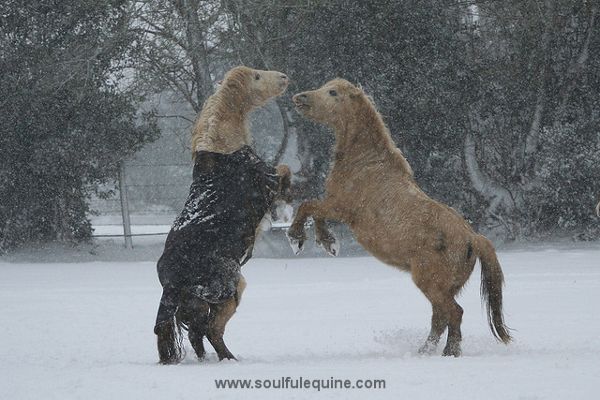
A long habit of not thinking a thing wrong, gives it a superficial appearance of being right.” ~ Thomas Paine (Introduction to Common Sense 1776)
Have you ever thought about why people blanket their horses in the winter? If you question and explore this practice, you may be surprised by what you’ll learn.
Blanketing horses in the winter is a common horse keeping practice when it starts to get a little chilly outside.
Yes, you heard me right, a little chilly.
During the first onset of colder weather I notice many horses with their flashy blankets on. Since I live in the middle of one of the larger horse areas in the country, I don’t have to drive far before I spot one or two horses like this.
Is Your Horse Really Cold?
Horses are masters at regulating their own body temperature. It’s easy for you to get in the way of what Mother Nature intended by blanketing your horse and or keeping her in a heated barn. It’s also easy to take human thoughts and actions and apply those thoughts and actions to your horse. This is when we get ourselves into trouble and our horse keeping practices become inferior and detrimental.
Most people think that their horse will get cold and that she needs a nice cushy stall to bed down in each night. This kind of thinking just makes the human feel better. This is a human thought and action that’s applied to horses versus thinking like a horse and understanding a horse’s true nature.
In the winter of 2009, we had a blizzard in Texas on Christmas Eve day … yes a blizzard in Texas. The barometric pressure dropped quickly and we had strong wind gusts of over 45 mph.
Two of my horses are in their mid-twenties. One of them is the horse that got me into natural hoof care when he got laminitis. Each year I allow my horses to grow their natural winter coats. They were outside during that storm and they were not blanketed.
They have wonderful wind blocks provided by my barn as well as multiple shelters. They’re always able to get out of the elements on their own. There are no stalls and I don’t waste my money on shavings. I also don’t bother spending money on expensive blankets.
All a horse needs is a shelter and wind blocks (not a stall) so they can get out of the extreme elements if they choose … notice I said extreme elements. They don’t need a stall bedded deep with shavings and they don’t need a blanket or a warm barn.
Additionally, a horse blanket can impair the circulation around the shoulder area creating tension in the neck, which can cause discomfort or other physical problems. This can happen even if the blanket does fit properly if it’s left on for long periods of time.
So why spend extra money on either?
Think how much you can save over time on shavings. Just for a minute, let’s think about the chores that revolve around shavings alone.
You drive somewhere to go pick up the shavings, you drive home and then you have to unload and store the shavings. You strip the stall and add the new shavings – sometimes you add extra shavings to an already bedded stall. Then you have to keep the stall clean and pick it at least twice per day. What a pain (unless you’re not the one doing all the chores). However, you’re still spending money on shavings and on the labor involved in keeping up the stalls.
If you keep your horses naturally, not only will you save money but also the time and effort involved in the extra chores. That time and money could be spent else where, like spending more quality time with your horse that doesn’t involve picking a stall or putting on a blanket.
Natural Horse Care Savings
Think for a minute how expensive horse blankets are. Many people own a wardrobe of blankets for their horses that cost enough to feed a small country.
No wonder horses get the reputation for being expensive. Human thought patterns, conventional beliefs and great marketing hype are what cause horses to be expensive.
If we keep our horses naturally, many expenses go out the window. We can also use that money to focus on more important things when it comes to our horses such as their foundation for health.
By kicking your horses out of the stalls and not blanketing, you can save a significant amount of money. Who doesn’t want that?
When To Blanket Your Horse
Please don’t read this and kick your sick or elderly, always-blanketed, unnaturally kept horse out in the cold.
One situation I can think of where a horse may need to be blanketed is if a horse is ill. For example, I know a natural hoof care professional who lives in Canada. He stresses that even in Canada, with their severe winters, they don’t blanket their horses unless there’s a reason such as them being sick.
From this point forward, I would suggest learning how to keep a naturally healthy horse so she can stay healthy throughout the winter months without blanketing.
What Horses Don’t Need In Cold Weather
- A cozy stall bedded with shavings
- A heated barn
- A blanket
- Extra grain (horses DO NOT need grain to stay warm, instead increase forage)
- Limited movement
What Horses Do Need In Cold Weather
- Plenty of free choice grass hay
- Water (at times you may need to warm it for them so they’ll drink enough during colder weather)
- Plenty of free choice, loose, unrefined sea salt
- Shelter and wind blocks to get out of the elements if they choose. Some horses will choose to be out in the snow, rain, etc. It should be up to them to decide.
- Allow plenty of movement. Again, movement plays a huge role in a naturally healthy horse, especially in the winter months when they need extra movement to produce body heat and keep their muscles loose.
- Additional nutritional support, NOT grain, in a situation where a horse has trouble keeping weight on.
Summary
Please share with me if you blanket your horse and, if you do, why you do it. Please don’t tell me it’s for vanity purposes just so your horse won’t look too hairy or because you want him slicked down all year. I have a feeling that unless it’s for that purpose (which I don’t agree with) then you don’t have a good reason. Please also don’t tell me your horse is too old and you must blanket her.
The practice of blanketing your horse is unnecessary and can also be detrimental to her health.
Keep it soulful,
Stephanie Krahl
####
Photo Credit – original photo modified in size and to include the Soulful Equine URL
